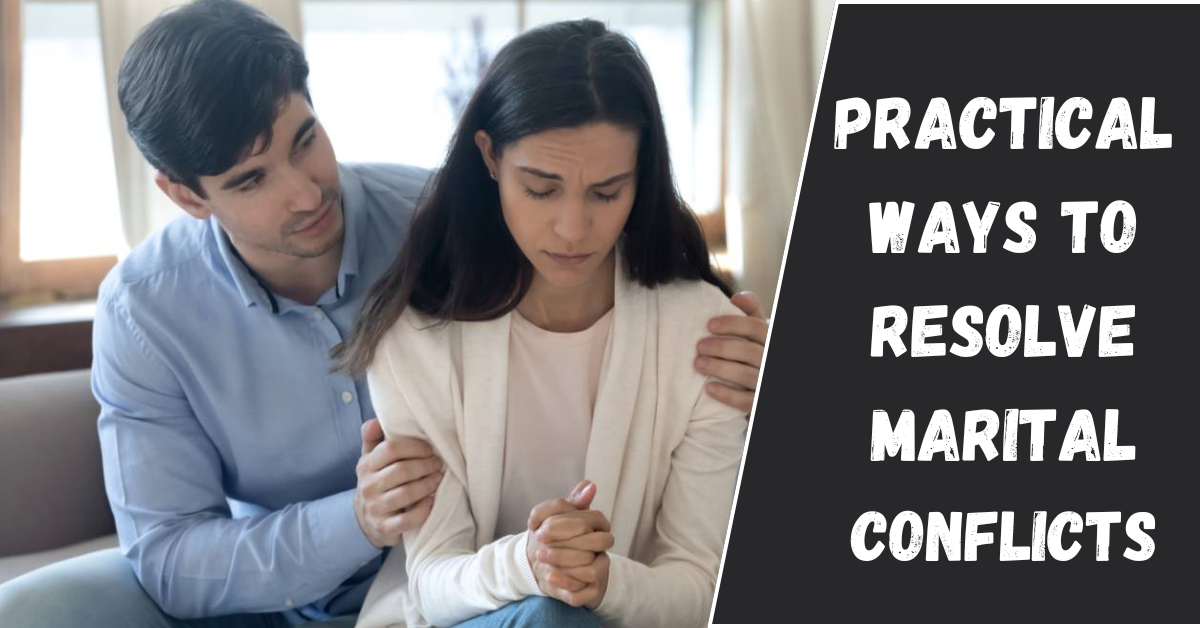If you’re finding yourself caught in the storm of marital conflicts, it’s crucial to remember that every relationship faces rough patches. As a Dating Guru, I understand that navigating these challenges can be daunting, but taking proactive steps to address them can often prevent them from escalating to the point of no return. By implementing practical strategies early on, you can foster open communication and strengthen the foundation of your marriage.
In this article, we’ll explore effective techniques that help you to resolve marital conflicts with your partner before they jeopardize the future of your relationship. From active listening to compromise and seeking professional guidance when needed, there are various approaches you can take to nurture a healthy and thriving marriage. By proactively addressing issues and working together with your spouse, you can build a stronger, more resilient bond that can withstand the test of time.
Understanding Marital Conflicts

Marital conflicts are an inevitable part of any relationship. They can arise from various sources, including communication issues, financial disagreements, or differences in values and priorities. Understanding the root causes of these conflicts is crucial in resolving them effectively.
- Acknowledge Emotions
When navigating marital conflicts, it’s essential to recognize and acknowledge your emotions and those of your partner. Emotions like anger, frustration, or sadness can drive conflicts but addressing them openly can lead to better communication and understanding. - Identify Triggers
Identifying triggers that escalate conflicts is key to prevention. By recognizing what sets off disagreements, you can work towards avoiding or addressing these triggers before they lead to a full-blown argument. - Communication Styles
Each person has a unique communication style, and understanding these differences can significantly impact conflict resolution. Pay attention to how you and your partner communicate, including verbal and non-verbal cues, to ensure effective and respectful dialogue. - Emotional Intelligence
Emotional intelligence plays a vital role in handling conflicts constructively. By being aware of your own emotions and reactions, you can respond thoughtfully rather than impulsively, fostering a more productive discussion. - Seek Common Ground
During conflicts, it’s crucial to find common ground with your partner. Focus on areas of agreement and shared goals to shift the conversation towards collaboration and mutual understanding.
By understanding the dynamics of marital conflicts and implementing these strategies, you can navigate disagreements more effectively and strengthen your relationship in the process. Remember, healthy communication and empathy are key to resolving conflicts before they escalate into more significant issues.
Effective Communication Strategies

When dealing with marital conflicts, effective communication plays a pivotal role in resolving issues before they escalate. Here are some practical strategies to enhance communication and strengthen your relationship:
Active Listening Techniques
To communicate effectively, it’s crucial to practice active listening. This involves fully concentrating on what your partner is saying, understanding their perspective, and showing empathy. Avoid interrupting them and validate their feelings to demonstrate respect and understanding. By actively listening, you create a safe space for open dialogue and constructive discussions, fostering a deeper connection with your partner.
Assertive Communication Skills
Assertive communication is essential for expressing your thoughts and feelings clearly and respectfully. It involves being direct and honest while considering your partner’s viewpoint. By using “I” statements to convey your emotions and needs without blaming or criticizing, you create a more conducive environment for productive communication. Assertive communication helps set healthy boundaries, promotes mutual understanding, and facilitates problem-solving in a constructive manner. Practice assertiveness to communicate your needs effectively and maintaining a relationship harmony.
Conflict Resolution Methods

When conflicts arise in your marriage, it’s crucial to address them effectively to maintain a healthy relationship. Here are some practical conflict resolution methods you can implement:
Negotiation and Compromise
In any marriage, negotiation and compromise are essential skills for resolving conflicts. Negotiation involves discussing differences and finding solutions that both partners can agree on. For example, if you and your spouse have different opinions on how to manage finances, you can negotiate a budget that meets both your needs. Compromise is about making concessions to reach a mutually satisfying agreement. It’s important to understand that compromise doesn’t mean giving up or losing; instead, it’s a way to find a middle ground where both partners feel heard and valued.
By practicing negotiation and compromise in your marriage, you can navigate disagreements effectively and strengthen your bond. Remember, healthy communication, empathy, and a willingness to work together are key to resolving conflicts before they escalate. Successful conflict resolution requires both partners to listen actively, express their thoughts respectfully, and find solutions that benefit the relationship as a whole.
Seeking Professional Help to Resolve Marital Conflicts

If you find that conflicts in your marriage are becoming increasingly challenging to navigate on your own, seeking professional help is a proactive step towards resolving issues before they escalate further.
- Marriage Counselors:
Consider consulting a marriage counselor or therapist who specializes in couples’ therapy. These professionals are trained to help partners communicate effectively, identify underlying issues, and develop strategies to address conflict constructively. - Therapeutic Interventions:
Therapeutic interventions, such as cognitive-behavioral therapy or psychotherapy, can provide valuable insights into individual behaviors, emotional responses, and relational dynamics. These interventions offer a safe space to explore concerns, gain perspective, and learn new ways of interacting with your partner. - Mediation Services:
In cases where disputes seem insurmountable, mediation services can offer a neutral ground for discussing differences and working towards mutually acceptable solutions. A mediator facilitates the conversation, helping you both express your needs and concerns while guiding the process towards resolution. - Support Groups:
Joining a marriage support group or participating in group therapy sessions can also be beneficial. Interacting with other couples facing similar challenges can offer a sense of community, validation, and fresh perspectives on managing conflicts within your relationship.
Remember, seeking professional help does not indicate failure but rather reflects your commitment to improving your relationship and addressing issues proactively. A trained professional can provide you with the tools, insights, and guidance needed to navigate conflicts successfully and strengthen the bond you share with your partner.
Conclusion
Remember, addressing marital conflicts early and effectively is key to maintaining a strong and lasting relationship. By practicing active listening, compromise, and seeking professional guidance when needed, you can navigate disagreements with empathy and understanding. Understanding each other’s communication styles and emotions, along with utilizing negotiation and compromise skills, will help you find common ground and strengthen your bond. Remember, seeking help from marriage counselors or therapists shows your commitment to growth and can provide valuable insights into resolving conflicts. With patience, communication, and a willingness to work together, you can overcome challenges and build a resilient partnership.
Frequently Asked Questions
What are some common challenges in marriages?
Marriages face challenges like communication issues, financial disagreements, and differing values.
How can couples address conflicts effectively?
Couples can resolve conflicts through active listening, compromise, and seeking professional help when needed.
Why is emotional intelligence important in conflict resolution?
Emotional intelligence helps partners respond thoughtfully, understand triggers, and communicate effectively during conflicts.
What role does seeking professional help play in resolving conflicts?
Professional help, such as marriage counseling or therapy, equips couples with tools to navigate conflicts successfully.

